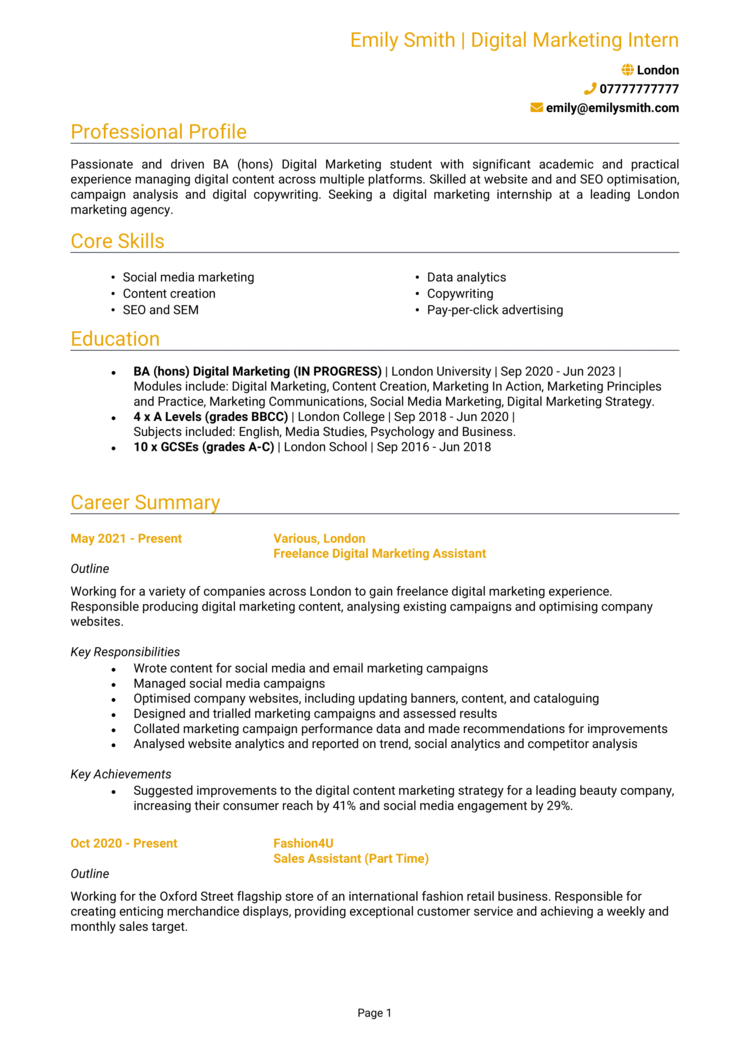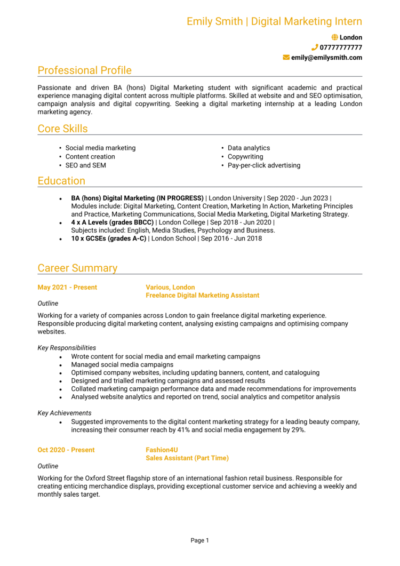Digital Marketing Intern jobs are engaging and rewarding, but competition to land one can be tough, when you have little or no experience.
Check out this example Digital Marketing Intern CV along with our simple CV writing guide, to help you create an impressive CV that will attract employers and land you plenty of job interviews.
|
Digital Marketing Intern CV example

Unsure of what your Digital Marketing Intern CV should look like?
Have a look at the CV example above to get familiar with the structure, layout and format of a professional CV.
As you can see, it provides plenty of relevant information about the applicant but is still very easy to read, and brief – which will please busy recruiters.
Digital Marketing Intern CV layout and format
First impressions count, so a sloppy, disorganised CV may cause your CV to be overlooked..
Instead, perfect the format and structure of your CV by working to a clear logical structure and applying some simple formatting tricks to ease readability.
Don’t underestimate the importance of this step; if your CV lacks readability, your written content won’t even be seen.
Formatting advice
- Length: Whether you’ve got one year or three decades of experience, your CV should never be more than two sides of A4. Recruiters are busy people who’re often juggling numerous roles and tasks, so they don’t have time to read lengthy applications. If you’re a recent graduate or don’t have much industry experience, one side of A4 is fine.
- Readability: To help busy recruiters scan through your CV, make sure your section headings stand out – bold or coloured text works well. Additionally, try to use bullet points wherever you can, as they’re far easier to skim through than huge paragraphs. Lastly, don’t be afraid of white space on your CV – a little breathing space is great for readability.
- Design: Don’t waste time adding fancy designs to your CV. It generally adds no value to your application and may even end up distracting recruiters away from the important written content.
- Avoid photos: It’s tempting to add a profile photo or images to your CV, especially if you’re struggling to fill up the page – but it’s best avoided! They won’t add any value to your application and, as are not a requirement the UK, so recruiters do not expect it, or want to see it.


CV structure
As you write your CV, divide and sub-head into the following sections:
- Name and contact details – Always start with these, so employers know exactly how to get in touch with you.
- CV profile – Add a short summary of your relevant experience, skills and achievements, which highlights your suitability.
- Core skills section – A 2-3 columned list of your key skills.
- Work experience – A detailed list of any relevant work experience, whether paid or voluntary.
- Education – An overview of your academic background and any training you may have completed.
- Hobbies and interests – A brief overview of your hobbies and interests, if they’re relevant (optional).
Now I’ll tell you exactly what you should include in each CV section.
CV Contact Details
Tuck your contact details into the corner of your CV, so that they don’t take up too much space.
Stick to the basic details, such as:
- Mobile number
- Email address – It should sound professional, such as your full name.
- Location -Just write your rough location, rather than your full address.
- LinkedIn profile or portfolio URL – If you include these, ensure they’re sleek, professional and up-to-date.
Digital Marketing Intern CV Profile
Your CV profile (or personal statement, if you’re an entry-level applicant) provides a brief overview of your skills, abilities and suitability for a position.
It’s ideal for busy recruiters and hiring managers, who don’t want to waste time reading unsuitable applications.
Think of it as your personal sales pitch. You’ve got just a few lines to sell yourself and prove you’re a great match for the job – make it count!
Tips for creating an strong CV profile:
- Keep it concise: Aim for a short, snappy paragraph of 3-5 lines. This is just enough room to showcase why you’d make the perfect hire, without going into excessive detail and overwhelming busy recruiters.
- Tailor it: The biggest CV mistake? A generic, mass-produced document which is sent out to tens of employers. If you want to land an interview, you need to tailor your CV profile (and your application as a whole) to the specific roles you’re applying for. So, before you start writing, remember to read over those job descriptions and make a list of the skills, knowledge and experience the employers are looking for.
- Don’t add an objective: Want to talk about your career goals and objectives? While the profile may seem like a good space to do so, they’re actually much better suited to your cover letter.
- Avoid cliches: Clichés like “blue-sky thinker with a go-getter attitude” might sound impressive to you, but they don’t actually tell the recruiter much about you. Concentrate on highlighting hard facts and skills, as recruiters are more likely to take these on board.
What to include in your Digital Marketing Intern CV profile?
- Summary of experience: To give employers an idea of your capabilities, show them your track record by giving an overview of the types of companies you have worked for in the past and the roles you have carried out for previous employers – but keep it high level and save the details for your experience section.
- Relevant skills: Employers need to know what skills you can bring to their organisation, and ideally they want to see skills that match their job vacancy. So, research your target roles thoroughly and add the most important Digital Marketing Intern skills to your profile.
- Essential qualifications: If you have any qualifications which are highly relevant to Digital Marketing Intern jobs, then highlight them in your profile so that employers do not miss them.
Quick tip: If spelling and grammar are not a strong point of yours, Use our quick-and-easy CV Builder to add pre-written content that has been created by recruitment experts, and proofread by our team.
Core skills section
Underneath your profile, create a core skills section to make your most relevant skills jump off the page at readers.
It should be made up of 2-3 columns of bullet points of your relevant skills.
Before you do this, look over the job description and make a list of any specific skills, specialisms or knowledge required.
Then, make sure to use your findings in your list. This will paint you as the perfect match for the role.


Work experience/Career history
Now that recruiters have a good overview of your skills and abilities, you need to jump into the detail of your career history.
Give them a more thorough insight into what you can do by creating a detailed list of your relevant experience.
Start with your current role, and work backwards through all the relevant positions you’ve held.
This could be freelance, contract or voluntary work too; as long as it’s related to the role you’re applying for.
Structuring your roles
Lengthy, unbroken chunks of text is a recruiters worst nightmare, but your work experience section can easily end up looking like that if you are not careful.
To avoid this, use my tried-and-tested 3-step structure, as illustrated below:
Outline
Start with a brief summary of your role as a whole, as well as the type of company you worked for.
Key responsibilities
Next up, you should write a short list of your day-to-day duties within the job.
Recruiters are most interested in your sector-specific skills and knowledge, so highlight these wherever possible.
Key achievements
To finish off each role and prove the impact you made, list 1-3 stand out achievements, results or accomplishments.
This could be anything which had a positive outcome for the company you worked for, or perhaps a client/customer.
Where applicable, quantify your examples with facts and figures.
Education section
Next up, you should list your education and qualifications.
This can include your formal qualifications (a degree, A-Levels and GCSEs), as well as sector-specific Digital Marketing qualifications and/or training.
While school leavers and recent grads should include a lot of detail here to make up for the lack of work experience, experienced candidates may benefit from a shorter education section, as your work experience section will be more important to recruiters.
Interests and hobbies
The hobbies and interests CV section isn’t mandatory, so don’t worry if you’re out of room by this point.
However, if you have an interesting hobby, or an interest that could make you seem more suitable for the role, then certainly think about adding.
Be careful what you include though… Only consider hobbies that exhibit skills that are required for roles as a Digital Marketing Intern, or transferable workplace skills.
There is never any need to tell employers that you like to watch TV and eat out.


Writing your Digital Marketing Intern CV
A strong, compelling CV is essential to get noticed and land interviews with the best employers.
To ensure your CV stands out from the competition, make sure to tailor it to your target role and pack it with sector-specific skills and results.
Remember to triple-check for spelling and grammar errors before hitting send.
Good luck with the job search!








